Santa Barbara’s Joanne Desmond — the First Female Evening News Anchor in the U.S. — Back in Spotlight in new Boston Strangler Film
Reporter From the Sixties Discusses Upcoming Film and her Groundbreaking Career in Journalism
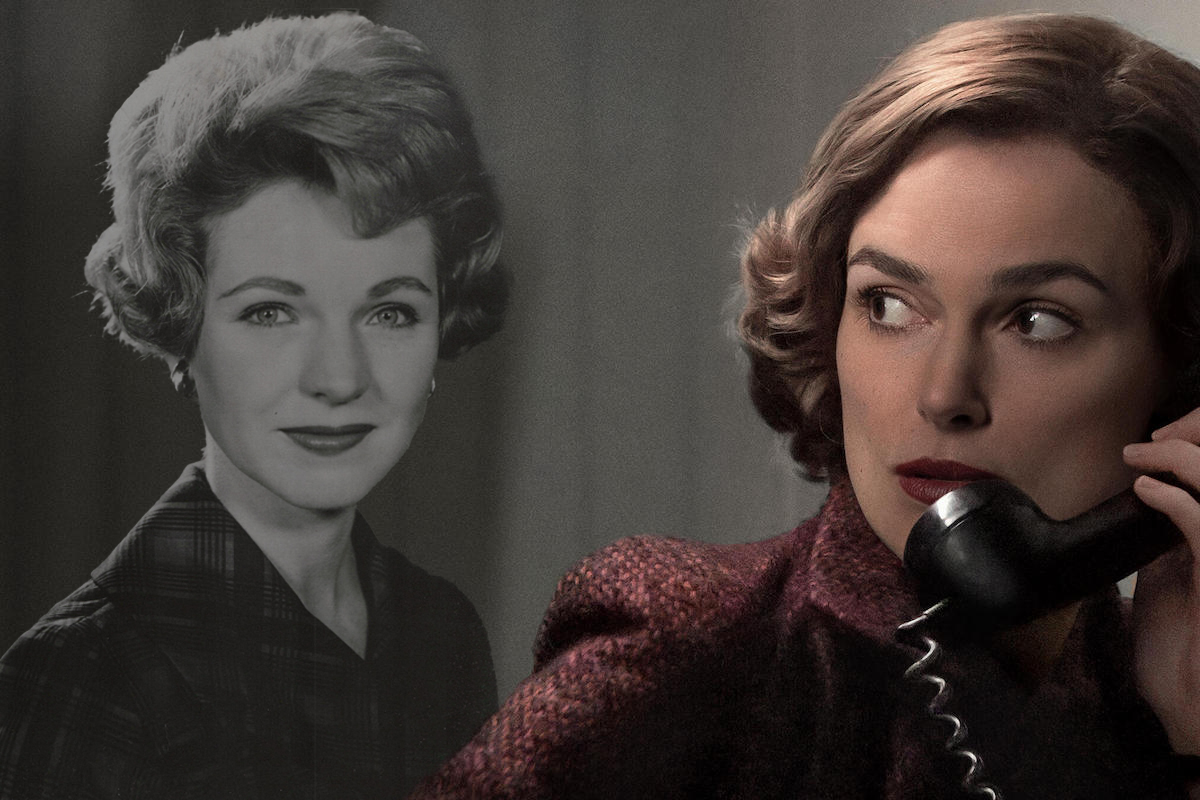
Reporter From the Sixties Discusses Upcoming Film and her Groundbreaking Career in Journalism

Nestled in a charming home in Santa Barbara, filled with a myriad of books on European artwork and Korean-inspired furniture, is Joanne Desmond, a Santa Barbara resident with big national news connections.
While Desmond may be settled in Santa Barbara today, she rose to the national spotlight in 1963, making history amidst the backdrop of the era’s deeply ingrained sexism as the first female evening news anchor in the United States and a reporter at Boston’s WBZ-TV. From there, Desmond hosted various talk shows across the country, as well as a television series based in Seoul focusing on Korean culture. Throughout this time, she covered various high profile cases, among which was the disturbing case of Albert DeSalvo, more commonly known as the “Boston Strangler,” which far transcended Boston and shook the country as one of the most famous serial killer cases in America.

On March 17, Hulu will release a new film, Boston Strangler, not only highlighting the powerful female reporters who helped crack the case, but also showcasing footage of Desmond’s original television report within the film.
I had the opportunity to speak with Desmond in her Santa Barbara home, discussing everything from her groundbreaking career, hauntingly intimate details surrounding the Boston Strangler case and the soon-to-be released film, and her upcoming memoir — all to show the profound influence and outreach that Desmond’s work from the 60s still holds in the modern day.
Before we get into the upcoming movie and the case, I would love to hear about you, and how you started your inspiring career in journalism. I’m sure that in the 60s, breaking into the news industry had its own set of challenges with the field being male-dominated. Desmond: Totally, well I was the only woman! I didn’t know what I wanted to do, but I had the feeling that I was at a point in history where I could kind of choose my own way, and maybe do things that even my mother and grandmother had not thought of. One lady said to me, “I think I heard recently that Betty Adams (who was doing the morning show at WBZ-TV) is leaving to get married. Why don’t you go see them?” And I thought, “Gosh, I would not have known that!” This was not the sort of thing you would see in the newspaper.
So you heard about the job opening through word of mouth? Yes, it was through word of mouth. So, I inquired about it, and the bottom line is I got the job interview. I had to be the only woman doing this because the general managers didn’t want to have people lined up around the block protesting that there were no women on our show. But, whatever it took to get the job! (laughs)
But they gave me the good stories, I mean, big ones — like interviewing Martin Luther King Jr. They didn’t give these stories to the men who had been there for 30 years…
The men at WBZ were a little afraid of me because they thought I’d take all the stories on politics, and I said, “Look, I’m trained in science and I would love to do the science stories.” Nobody was covering them in those days, so I really became the first female science reporter. MIT and Harvard would send in press releases and they would get thrown in the wastebasket, because none of the men could read them!
But I could — I could read them.

At the time, were you aware that the work you were doing in journalism would later come to have you regarded as a pioneering news anchor in Boston? No, I should have, but I wasn’t aware. My whole focus was to just be as good as the men, and luckily I had parents who trained me that I could be just as smart as they were, and that I could do any story that they did.
I was not really aware of it [being a pioneer]. I was surprised when later people would get so excited about it. I didn’t think of myself as being that different from the men, because I wasn’t a female, I was a reporter. Later, after I retired, I realized that I had helped make it easier for other women to do this.
Can you tell me about your experience conducting television interviews with such esteemed individuals, from President Kennedy and his family to Dr. Martin Luther King Jr., the first Astronauts, movie stars, Nobel Prize winners, world leaders, etc.? There’s a whole chapter on each one of those interviews in my upcoming book, my memoir… What I’ve decided to do is to take each chapter and see how it relates to today, see how there was a direct change in our culture from each story that I did. That brings it up to date, and I really like this idea because lots of the time memoirs are just “Oh, I did this!” No, no, I wanted to have the book relate to things that we’re experiencing today, that those people set in place. And I had just the right question for Martin Luther King, but I can’t tell you — it’ll be in the book!
Covering the Boston Strangler Case must have been a big change from these types of interviews. Can you tell me about the psychological experience of reporting on such an intense case? Terrifying, I was scared to death.
What were some of the challenges that being a reporter for this case entailed? At the time there was no such thing as “fake news.” We had no spin. You could not even show, with as little as a raised eyebrow, what you thought about what you were reporting on. These were the times when the reporter was nothing more than a vehicle to transport news, and you couldn’t tell anyone how you felt about it.
I’m sure that was really challenging when reporting on the Boston Strangler case. Right, because I could see who was at fault, lots of times. I could see who wasn’t doing their job fully, but I couldn’t report on them.
I would like to hear you elaborate on this quote from the press release, “As Joanne’s star rose, she garnered the attention of one fan she never wanted: the Boston Strangler. His stalking and admitted fascination with her added a gruesome danger to her job everyday.” It was scary because he used to write me fan letters. It was early on when I was on the job, just a couple of weeks. One day, I opened up one letter from him and I turned around to my boss and asked, “Is this what it’s gonna be like now?”
What was in the letter? It was a letter, written in small writing — almost like an engineer would write — and it said, “Please put your bust measurement” for me to write it in, and “Please put your waist measurements,” or “Please put your hip measurements”’ followed by a line. Yeah, it scared me so much. And that wasn’t the only letter I got from him.
How many letters do you think he wrote you? Maybe four or five. And somewhere I read that he used to like to go home and watch the girls report on his killings.
There was one time when somebody came into the station, we didn’t know who he was. He was somebody who had called up the weatherman and said he would like to come out and learn more about the weather. He would ask the weatherman, ‘Is Joanne down in the studio right now?”
The man was short with darker features, and the Boston Strangler was short with darker features… He would just show up, and then disappear.
Did you ever come face to face with him when he would show up at the station? Never.
Sign up for Indy Today to receive fresh news from Independent.com, in your inbox, every morning.
The Boston Strangler case has been referenced throughout pop culture, for example, The Rolling Stones’ song Midnight Rambler references DeSalvo. What is your opinion on the case being commented on throughout pop culture, and in particular, being adapted into a modern day film? Yeah, it’s different every time somebody finds some new aspect to it, and it’s incredible that they got away with doing another movie on the Boston Strangler! They’re using a different phrase, “based on real events,” in the film, which gives them the legal latitude to switch some things up.
Is it interesting or strange to see this event that you lived through become fictionalized? Oh, I haven’t seen the film yet. The first show is in Boston next week, and then I go to the big premiere in New York, and I’ll see the movie there.
I couldn’t watch the other movies. I watched the first movie on the Boston Strangler and I had to have two or three strong cups of coffee to watch it. It was just traumatic for me.

That’s completely understandable. Do you feel that with a substantial amount of time having passed since then, you’re in a place to revisit this case with the movie coming out soon? Maybe. My daughter is coming with me, bless her heart. I’ve got some moral support. I can’t tell you what it’s gonna be like. But I do want to hear it all, and see how I take it. And I think I’m okay.
The film, Boston Strangler is told through the lens of female reporters Loretta McLaughlin and Jean Cole, rather than focusing primarily on DeSalvo. Do you think the film will be a good way of spreading further awareness about how the case unfolded, and about the female journalists, yourself included, that pioneered the investigation at the time? Maybe… that’s a very good point, why didn’t I think about that?
You said that you are going to the premiere of the movie in New York. What aspects of the film are you looking forward to seeing the most? In most movies and most writing, you need to show a large amount of either fear, or struggle, of some sort. Everything needs that. I’m interested to see how they use conflict in the film. We know from studies that people are willing to be terrorized if they learned something from it. I don’t know why; I wouldn’t want to be! But I’m going to watch out for that. And I’m going to watch for what you just said, about how women can do a good job of telling this story.
Was it controversial for women at the time to take on high profile murder cases? If so, how did you deal with this? No, we just did it… you were a reporter, period. If you wanted to play the game, you played the game straight.
I was amazed that they would send me out to report on fires a lot, where the fire would triangulate and I would be stuck in the middle, and I’d say guys, “I can’t get out!” My coat would have little burn marks all over it.
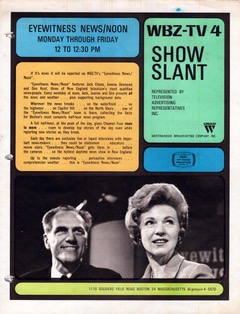
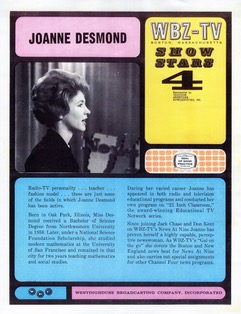
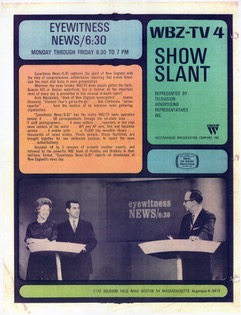
Joanne Desmond promos for WBZ-TV | Photo: Courtesy
I was reading an article from the Boston Herald about the upcoming film, and it included a quote from Kevin Cole, the brother of Jean Cole, a reporter on the case. Kevin Cole notes that “the city (of Boston) was in total fear. I’ve never seen anything like it.” This sounds eerily like the clip of your news report featured in the Boston Strangler film, where you say, “The city is for some, glamorous, stimulating, prosperous… Only recently has it become dangerous,” along with, “One karate course is advertised as ‘a must’ for city living.” Do you have memories of the “total fear” that had taken over Boston at this time? Women slept with the light on all night. All of a sudden, the apartment’s electric bills were horrible.
In a piece that I wrote at the time, I said, “Here are some things you can do…” For example, go buy a pair of men’s galoshes at a thrift store. You’ll pay, you know, $2 for them, and then go put them in the mud, get them nice and dirty, and put them out in front of your door. I would also say to place a wine bottle or something in between your window panes, so that if anyone tried to break in through the window, the bottle would break and you’d hear a big noise and it’d be a big splash.
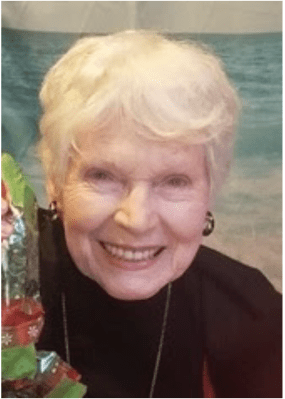
A lot of preventative measures for potential crime. In my piece, I wrote about ten different ideas, and phones just lit up. All of these calls wanted to know where to buy the recording of a dog barking that I mentioned (laughs).
I hear that you are writing a new memoir. Can you tell me more about this? See over there? (Joanne points to a brown wicker basket in her home) That is my whole book! It has all the chapters in it, each one focusing on one particular story or interview of mine. (Joanne opens the basket, and leafs through folders holding information for each chapter.) I have one chapter on Eyes on Korea, I did a whole series there (in Seoul); of course Martin Luther King has a whole chapter; the discovery of DNA is a whole chapter; the Cuban Missile Crisis — that was a big one!
Do you have a title for the book right now? My daughter suggested one, Breaking News: Sexism, Serial Killers and the Sixties. It was a very exciting time, when there were a lot of things happening.
Once we get through with the trip to the movie premiere, I’m going to go full speed ahead on the book. It should be out, hopefully, this year. It’s my goal.
Please note this login is to submit events or press releases. Use this page here to login for your Independent subscription
Not a member? Sign up here.
You must be logged in to post a comment.